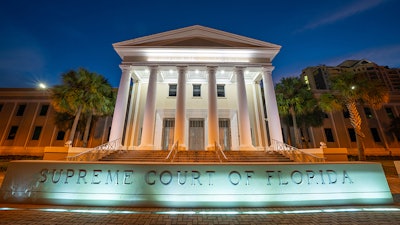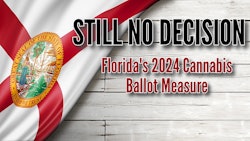
Florida voters will decide the fate of a citizen-initiated constitutional amendment to legalize adult-use cannabis in the November 2024 election after the state’s Supreme Court approved the measure’s ballot language in a 5-2 decision April 1.
The court’s justices, who heard oral arguments on the proposal in November 2023 after state Attorney General Ashley Moody filed a four-part argument against allowing the measure to go before voters, had until April 1 to approve or reject the language, per Florida Constitution.
In Monday’s decision, the majority opinion ruled that the proposed adult-use legalization ballot language is sufficient to go before voters on Nov. 5.
Justices Charles T. Canady, Jorge Labarga and John D. Couriel concurred in the majority opinion, while Chief Justice Carlos G. Muñiz and Justice Jamie R. Grosshans concurred with separate opinions.
“Our role is narrow—we assess only whether the amendment conforms to the constitutionally mandated single-subject requirement, whether the ballot summary meets the statutory standard for clarity, and whether the amendment is facially invalid under the federal constitution,” Grosshans wrote in the opinion. “In light of those limited considerations, we approve the proposed amendment for placement on the ballot."
This decision comes after the Florida Supreme Court ruled in 5-2 decisions in 2021 that a pair of previous attempts to legalize adult-use cannabis via the 2022 election did not meet legal standards.
- In April 2021, the court ruled that Make it Legal Florida’s proposed ballot summary was misleading by failing to disclose that cannabis would remain illegal under federal law.
- In June 2021, the court ruled that Sensible Florida Inc.’s proposed ballot summary was misleading by including the words “for limited use” for persons 21 and older.
The 2024 ballot measure—sponsored by Smart & Safe Florida and financially backed by more than $40 million in contributions from Tallahassee-based multistate cannabis operator Trulieve, which has more than 130 medical dispensaries in Florida—did disclose in the summary language that the amendment would “not change, or immunize violations of, federal law” and that it would establish “possession limits for personal use.”
“We are thankful that the Court has correctly ruled the ballot initiative and summary language meet the standards for single subject and clarity," Trulieve CEO Kim Rivers said in a statement provided to Cannabis Business Times. "We look forward to supporting this campaign as it heads to the ballot this November."
Breaking News: Court gives the green light! Our mission to empower adults to safely consume cannabis takes a leap forward as the ruling favors letting voters decide. Let's make our voices heard! #YesOn3 pic.twitter.com/5Sqn9VOxRz
— Smart & Safe Florida (@SmartandSafeFl) April 1, 2024
The 2024 language was purposely left simple based on past rulings by the Supreme Court, Zachary Kobrin, partner at Saul Ewing, told CBT earlier this month. Kobrin, a Fort Lauderdale-based cannabis law and corporate attorney, is the former vice president and general counsel for Trulieve.
“It was crafted in a way to avoid the faults and flaws of the past initiatives that failed,” he said. “So, to a certain extent, the onus is going to be on the Legislature to pass regulation implementing [adult-use legalization], which is how it should be. … It expressly says the Legislature can pass legislation regulating and how they see fit.”
The justices refuted this claim during November’s oral arguments and, ultimately, in the 5-2 ruling issued Monday.
“The opponents’ other clarity arguments fare no better,” the justices wrote in the April 1 opinion. “For example, the summary is not misleading for failure to warn that the amendment only covers Florida law and not federal law. Rather, it follows the federal-law-effects ‘roadmap’ first laid out in the Medical Marijuana cases.”
The justices also refuted the attorney general’s argument that the word “allow” would overtly mislead voters that the amendment would allow other entities in addition to Florida’s existing medical cannabis operators to automatically enter an adult-use marketplace when in fact the state Legislature must first authorize these additional entities to do so.
“We reject this argument,” the justices wrote. “The most natural reading of the word ‘allow’ suggests that other entities will be permitted to enter the market, subject to a state-licensing process. Licensing is a commonly understood activity of government agencies. Voters are familiar with obtaining other licenses from the state, such as a driver’s or contractor’s license. We do not believe the summary would confuse a voter into thinking that the Legislature is required to authorize additional licenses or that the amendment itself establishes a licensing scheme. It is therefore fair to say that the amendment ‘allows’ additional licensure but does not mandate it.”
Key provisions in the proposed 2024 constitutional amendment include allowing:
- existing medical operators to remain vertically integrated while expanding to a forthcoming adult-use market;
- the Florida Legislature to determine a process for licensing additional market entrants; and
- adults 21 and older to purchase and possess up to 3 ounces of dried flower or 5 grams of concentrate for personal use.
In addition, the amendment states adults and licensed operators “shall not” be subject to criminal or civil liability or sanctions under Florida law for use, possession and commercial operations.
Now that the Supreme Court approved the amendment’s ballot language, the next step for legalization advocates and industry stakeholders is to make sure it passes, Kobrin said.
“So, using a lot of the money that they raised,” he said. “I would assume, like most campaign initiatives, they’ve got a lot of money and ad buys already lined up. … I would assume, as we get closer to the election, we’ll see a large media blitz in Florida. I would assume every operator in Florida is going to get on board.”
The measure, like all citizen-initiated constitutional amendments in Florida, now needs a 60% supermajority vote to pass in November, a threshold that was approved by the state’s voters in 2006. Among 13 states that have legalized adult-use cannabis through citizen-initiated ballot measures, only Arizona, in the 2020 election, has met that 60% threshold. New Jersey (67.1%) and Maryland (67.2%) voters approved legislative-referred referendums.
In Florida, 67% of voters said they would support a constitutional amendment allowing adults to purchase and possess personal amounts of cannabis, according to a November 2023 survey conducted by pollsters at the University of North Florida’s Public Opinion Research Lab; 28% of those surveyed said they’d vote against it.
Still, myriad factors can influence voters during an actual election. Florida’s supermajority threshold doomed the state’s first attempt at legalizing medical cannabis in the 2014 election, despite 57.6% of voters supporting Amendment 2.
Two years later, Florida voters backed a medical cannabis legalization measure with a 71.3% majority to pave the way for today’s marketplace, which now includes 627 dispensaries operated by 22 licensees, according to the states’ Office of Medical Marijuana Use. And this represents the largest medical cannabis market in the country with more than $2 billion in retail sales in 2023, according to industry research firm Brightfield Group.
While medical cannabis is exempt from sales taxes under Florida law, no such exemption would exist for adult-use cannabis. And although a cannabis tax structure would be dependent upon forthcoming legislation should voters approve the constitutional amendment this November, a financial information statement on the adult-use proposal estimates an increase of anywhere from $195.6 million to $431.3 million annually in state and local tax revenues in Florida.
The upward figure could potentially be much higher should the state impose an excise tax on adult-use sales, according to the Florida Office of Economic and Demographic Research (EDR).
“More than half of the reviewed states have a separate excise tax in addition to a sales tax on the sale of nonmedical marijuana,” according to EDR’s financial statement. “Creation of such an excise tax in Florida would require legislative action. Whether the Legislature would take such action is unknown and therefore was not addressed in these estimates.”
EDR projected added costs of creating and maintaining a regulatory structure for an adult-use marketplace to be $11.4 million annually with an additional $9 million in startup costs to launch a program.
With the ballot language now approved by the Supreme Court, Floridians will have the opportunity to join the 24 states that have legalized adult-use cannabis since 2012 in the U.S.
The effective date of the amendment would be six months after approval by voters.

























